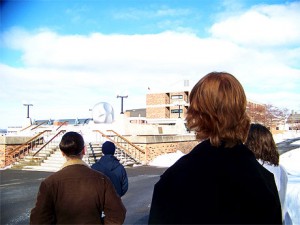Regardless of the size of a college campus, prospective college students feel overwhelmed as they visit possible destinations that will serve as their future study, work and living environments. Their visit to campus is where the organizational and informational duties of a campus tour guide come in.
After four years volunteering as a tour guide for Ithaca’s Roy H. Park School of Communications, I can tell you that keeping up with the latest information and updates about the college’s innovations has been challenging. Not to mention the somewhat daunting initial training that requires participants to memorize facts about the institution’s history, founding, and noteworthy alumni.
But beyond all the built-in marketing strategies of being a tour guide, visitors want personal stories of trials and tribulations regarding a student’s own college career. They want to know about the work you put in to the process of writing that final paper or completing that final group project in your toughest class. They want more information on that internship you had in a European city or your community service project in a developing nation.
These learning experiences that are connected to the campus can be used to empower prospective students and give them the impression that they can fulfill their own goals if they work hard and create luck for themselves. An effective tour guide will also make a student feel like they can fit in to the campus atmosphere each day of their undergraduate studies.
College students have a tendency to tune out professors and administrators who talk incessantly about their work experiences and research in the field. Before they come to campus however, they want to hear from someone who isn’t shy about sharing their evolving educational process. A well-rounded tour guide fills this need and often influences a prospective student’s final decision on which college to attend.







